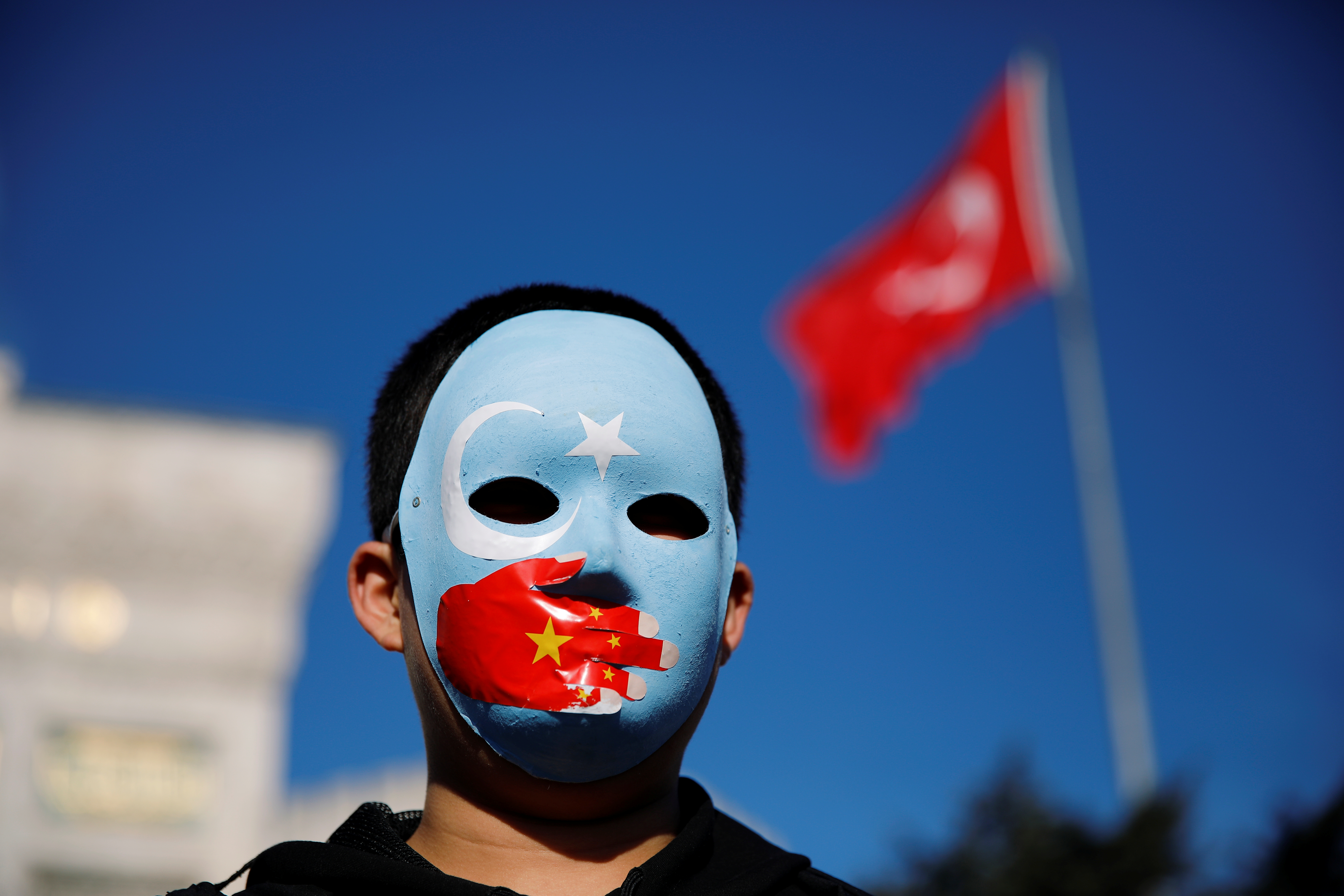China's war on religion
To secure its hold on power, the Communist Party is tightening its control over all faiths in China

A free daily email with the biggest news stories of the day – and the best features from TheWeek.com
You are now subscribed
Your newsletter sign-up was successful
To secure its hold on power, the Communist Party is tightening its control over all faiths in China. Here's everything you need to know:
When did the crackdown begin?
Religious repression has intensified across China since President Xi Jinping took office in 2013. The brutal crackdown on minority Muslims in the northwestern region of Xinjiang — where mosques and madrasas are being demolished and more than 1 million Uighurs have been detained in re-education camps — has sparked international outrage. But the Communist Party's assault on faith is not limited to Islam. Authorities have used the world's distraction over the coronavirus pandemic to accelerate an ongoing campaign against Christianity. Officially atheist, the party sees adherence to any faith, particularly those with foreign origins such as Christianity and Islam, as a threat to its dominance. So Xi has embarked on the "sinicization" of religious practice, ordering Muslim, Buddhist, and Christian leaders to integrate Chinese communist thought into their belief systems. The party wants people "to love the motherland and their faith," says You Quan, head of the body that oversees ethnic and religious affairs in China. Sinicization has resulted in thousands of churches and mosques being shuttered and razed; those that remain fly Chinese flags.
The Week
Escape your echo chamber. Get the facts behind the news, plus analysis from multiple perspectives.

Sign up for The Week's Free Newsletters
From our morning news briefing to a weekly Good News Newsletter, get the best of The Week delivered directly to your inbox.
From our morning news briefing to a weekly Good News Newsletter, get the best of The Week delivered directly to your inbox.
How is Christianity practiced in China?
For decades, Chinese Catholics and Protestants have been divided between those who attend state-sanctioned churches — in which clerics are appointed by Beijing — and those who attend so-called underground churches. About half of China's 12 million Catholics worship in the underground churches loyal to the Vatican. To try to heal that schism, Beijing and the Vatican struck a deal in 2018 that gave Chinese authorities the right to recommend new bishops and the pope the power to approve or veto them. Beijing has exploited that agreement by refusing to name bishops to half of China's 98 dioceses, while pressuring priests to adhere to party regulations, saying that the Vatican pact means that the pope commands them to do so. Portraits of the Virgin Mary have been replaced by portraits of Xi, and priests have been compelled to incorporate Xi's sayings into their sermons.
What about Protestant churches?
Protestantism is China's fastest-growing religion, and so is especially worrisome to Xi. The state-registered church, the Three-Self Patriotic Movement, claims some 39 million adherents. But at least another 40 million are thought to worship in underground "home churches" — pushing the share of Chinese who are Protestants to nearly 6 percent, about the same as the membership of the Communist Party. Beijing is determined to control the faith. Online bookstores have been banned from selling Bibles as authorities prepare a new Mandarin translation that some fear will omit whole chapters. Pastors have been ordered to attend government-sponsored training sessions, where they are told that in China the "state leads and church follows." Thousands of underground churches have been closed. At those that remain open, symbols of faith have been purged, with crosses and Bibles burned. Facial recognition cameras have been installed so that authorities can track and harass worshippers, a tactic pioneered against Buddhists in the autonomous Chinese province of Tibet.
A free daily email with the biggest news stories of the day – and the best features from TheWeek.com
What happened in Tibet?
Tibetan Buddhism has been targeted by Beijing for decades because it is a central pillar of Tibetan identity. That repression has ramped up under Xi. Tens of thousands of party members have been deployed to temples and villages under an outreach initiative that doubles as a surveillance program. And since 2016, up to 17,000 Buddhist monks and nuns have been evicted from two key training institutes and sent to indoctrination centers where, the U.S. State Department reports, they were beaten and shocked with electric batons. Chen Quanguo, the Politburo member who oversaw the Tibet crackdown, was sent to Xinjiang in 2016 to use the same playbook against Uighur Muslims. Detainees are forced to say "there is no God, there is only the Communist Party," said Omer Kanat, head of the U.S.-based Uighur Human Rights Project.
Are other religious groups being repressed?
The Hui, a Muslim minority of some 10 million people in central China, are now suffering the same fate as the Uighurs. Their mosques are being sinicized, stripped of domes and minarets, and the call to prayer has been banned. Many Hui fear that concentration camps may come next. The only faith that remains relatively free is Chinese Buddhism, which is seen as indigenous. Still, it, too, is being pressed into party service: In 2018, the Shaolin Monastery — birthplace of kung fu — was forced to fly the Chinese national flag for the first time in its 1,500-year history.
How has the U.S. responded?
The Trump administration has sanctioned dozens of companies and governmental bodies connected to human rights abuses in Xinjiang. And last month, Chen and three other top officials were hit with sanctions under the Global Magnitsky Act, freezing their U.S. assets and banning American companies from doing business with them. The U.S. will not stand by, said Secretary of State Mike Pompeo, as the Communist Party attempts to eradicate Uighurs' "culture and Muslim faith." But outside pressure is unlikely to alter Chinese policy, says Karrie Koesel, an expert on religion in China. "The state," she says, "sees religion as an existential threat."
Eradicating Falun Gong
The Chinese government has identified "five poisons" that threaten its rule: pro-democracy activists, Taiwanese nationalists, Tibetan dissidents, Uighur separatists, and Falun Gong — a spiritual discipline that mixes traditional qigong with New Age philosophy. Founded in northeast China in 1992 by former trumpet player Li Hongzhi, Falun Gong ("law wheel practice") promises salvation to those who study Master Li's texts and practice a regimen of gentle physical movements. Li attracted some 70 million followers in a matter of years, a level of popularity that worried the Communist Party. It banned Falun Gong in 1999, labeling the movement an "evil cult" and arresting tens of thousands of adherents. Human rights activists say thousands were killed and had their organs harvested for transplant. Falun Gong practitioners who fled to Hong Kong, where they could practice freely, fear a sweeping new security law imposed on the city by Beijing could now be wielded against them. "It is a hanging knife over our heads," said Ingrid Wu, a Falun Gong spokeswoman.
This article was first published in the latest issue of The Week magazine. If you want to read more like it, you can try six risk-free issues of the magazine here.
-
 The Olympic timekeepers keeping the Games on track
The Olympic timekeepers keeping the Games on trackUnder the Radar Swiss watchmaking giant Omega has been at the finish line of every Olympic Games for nearly 100 years
-
 Will increasing tensions with Iran boil over into war?
Will increasing tensions with Iran boil over into war?Today’s Big Question President Donald Trump has recently been threatening the country
-
 Corruption: The spy sheikh and the president
Corruption: The spy sheikh and the presidentFeature Trump is at the center of another scandal
-
 The fall of the generals: China’s military purge
The fall of the generals: China’s military purgeIn the Spotlight Xi Jinping’s extraordinary removal of senior general proves that no-one is safe from anti-corruption drive that has investigated millions
-
 Epstein files topple law CEO, roil UK government
Epstein files topple law CEO, roil UK governmentSpeed Read Peter Mandelson, Britain’s former ambassador to the US, is caught up in the scandal
-
 Iran and US prepare to meet after skirmishes
Iran and US prepare to meet after skirmishesSpeed Read The incident comes amid heightened tensions in the Middle East
-
 EU and India clinch trade pact amid US tariff war
EU and India clinch trade pact amid US tariff warSpeed Read The agreement will slash tariffs on most goods over the next decade
-
 Israel retrieves final hostage’s body from Gaza
Israel retrieves final hostage’s body from GazaSpeed Read The 24-year-old police officer was killed during the initial Hamas attack
-
 China’s Xi targets top general in growing purge
China’s Xi targets top general in growing purgeSpeed Read Zhang Youxia is being investigated over ‘grave violations’ of the law
-
 Panama and Canada are negotiating over a crucial copper mine
Panama and Canada are negotiating over a crucial copper mineIn the Spotlight Panama is set to make a final decision on the mine this summer
-
 The app that checks if you are dead
The app that checks if you are deadIn The Spotlight Viral app cashing in on number of people living alone in China